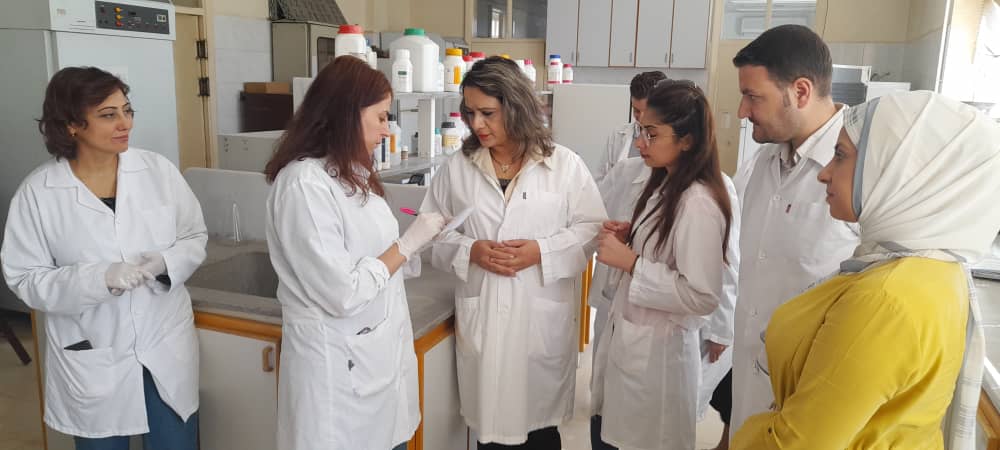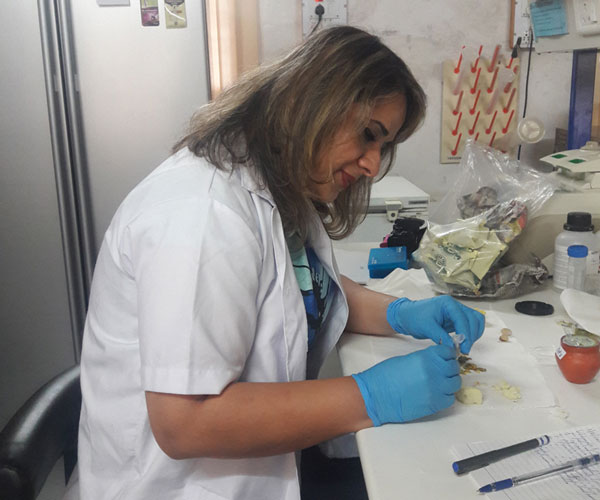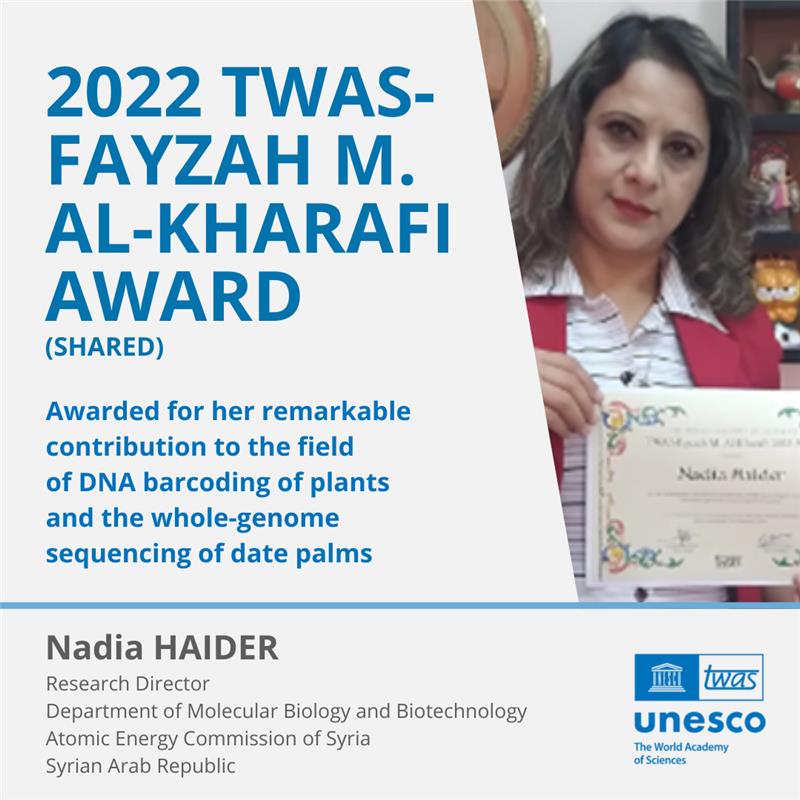
Deforestation, livestock grazing, and urban development are major threats to native plant life in Syria. On top of that, other hazards like water pollution and climate change-driven drought deeply constrain future agricultural and economic development.
For her outstanding research in response to these challenges, Syrian biotechnologist Nadia Haider won the 2022 TWAS-Fayzah M. Al-Kharafi Award. She shared the prize with Sayera Banu, the head of the Programme for Emerging Infections at the Infectious Diseases Division at icddr,b in Dhaka, Bangladesh.
Haider is a research director with the Department of Molecular Biology and Biotechnology of the Atomic Energy Commission of Syria (AECS) in Damascus, Syria. She identifies genetic variations in crops and wild plants for facilitating, accelerating and optimising conservation and crop improvement programmes that produce species tolerant to various stressors, including high salt content in the water they need to thrive.
"Syria is the home to many plants that have been domesticated, becoming important agricultural crops such as wheat, barley, lentils, chickpeas, chervil, peas and flax, and offers a number of fruit trees such as dates, almond and figs, but also medicinal and aromatic plants," said Haider. "Wild species, in particular, represent a large pool of genetic diversity from which to draw new genetic variations required in laboratory breeding programmes, for the betterment of cultivated commercial varieties."
The TWAS-Fayzah M. Al-Kharafi Award is an annual award named after TWAS Fellow Fayzah M. Al-Kharafi, which acknowledges preeminent women scientists from scientifically and technologically lagging countries.
"My sincere thanks go to TWAS and Professor Al-Kharafi for rewarding me. Winning such an honourable award makes me feel more confident, and happy that my work has been valued by such a well-reputed academy and TWAS Fellow," she said. "The TWAS-Fayzah M. Al-Kharafi Award gives me a strong support base for the future. It reflects the approval and gratitude for my good research, prompting me to be more competitive."
Barcoding plants
Haider earned her PhD in plant biotechnology in 2003, at the University of Reading’s School of Plant Sciences (now School of Biological Sciences), in the United Kingdom. Since then, she has focused her scientific interest on the analysis of plant DNA for various applications. In 2015, the world database Scopus named her as one of the "Top hundred Syrian researchers around the world."
She has deeply investigated the DNA barcoding of plants, a method for the identification of vegetal species through molecular comparison of specific DNA regions. DNA barcoding refers to the use of a standardized short sequence of DNA that allows “to make species identifications in a rapid, accurate, and cost-effective manner," Haider clarified. "It represents the most reliable approach available to analyze specimens and specimen-based data for systematic research."
The term barcoding comes from supermarket scanners used to uniquely identify products using a code printed on the container. Similarly, scientists use a unique, identifying sequence taken from an organism’s gene and compare it to similar sequences in samples of other species, thus identifying where they match, and where they differ.
"I started working on the barcoding of plants many years ago, during my PhD research, in 2000–2003," Haider recalled. "I designed many universal primers (short DNA sequences) for plants that target specific regions of the DNA. Then I used DNA barcoding for the identification of plant species such as those of legumes, roses, and orchids, and for the detection of bio-adulterants in food products such as spices, meat, tea and coffee."
Hunting for frauds
In order to maximize profits, fraudulent producers may add to foods or herbal medicines some adulterants, i.e. substances that increase the weight or simulate a better-quality product. But such additions lower the overall quality and affect the nutritional properties of the commodity, often making it unsafe.
In particular, bio-adulterants are produced by and obtained from living organisms and contain DNA different from that present in pure products. This, explained Haider, allows easy spotting of adulterations: researchers can identify foreign DNA in any sample by using Polymerase Chain Reaction (PCR), a laboratory technique that rapidly produces (amplifies) millions to billions of copies of a specific region of DNA. "Using PCR, we may carry out both qualitative and quantitative analysis, hence detect bio-adulterations."
Haider has applied this technique to find bio-adulterants in meat, spices, pistachio, tea, and Damask rose (Rosa damascena), all relevant to the Syrian economy. She has also characterized from a molecular point of view wheat and legumes, comparing wild species and cultivated varieties, the Syrian pear (Pyrus syriaca) as well as wild orchid, putting special emphasis on coffee analysis.
Coffee, in fact, is a common target of adulteration: a common practice involves the substitution of the more expensive Arabica variety with the less prestigious Robusta. Using DNA-based methodologies that she personally adapted to this beverage, Haider and her collaborators succeeded in coffee authentication, even from the brewed drink, effectively detecting differences in mixtures of Arabica and Robusta with as low as 1 per cent in adulterant DNA content.
"This novel approach will be able to advance coffee authentication methods for safeguarding coffee producers and consumers," Haider noted.
Committed to Syria
Haider’s commitment to the protection of valuable Syrian crops included the characterization of both the Syrian and the Algerian varieties of cultivated date palms (Phoenix dactylifera).
Historians believe that the date palm is among the first tree cultivated by human beings, with the first harvest of its fruit nearly 7,000 years ago. Recognizing that “the ancient historical relationship between the Arab region and date palms has enabled a rich cultural heritage that has been passed on through generations,” in 2022 UNESCO added this tree and the relevant traditions and practices to the list of the Intangible Cultural Heritage of Humanity.
Using molecular techniques, Haider and her collaborators were able to re-sequence the whole genome of date palms clarifying the evolutionary relationship between date palms and oil palms, paving the way for improved breeding plans. The researchers published the results of their study in Nature Communications. Date palms are susceptible to the "Bayoud" disease, caused by a fungal infection that devastates the plantations, and Haider used PCR for rapid analysis of the Syrian and Algerian date palms to detect molecular markers of susceptibility or resistance to the disease. By invitation, she also published a chapter in the UNESCO-Encyclopedia of Life Support Systems on using molecular techniques to reveal evolutionary relationships among date palm varieties.
Today, Haider is the holder of five patents for designing universal primers for land plants, including grasses, and developing molecular markers for targeting bio-adulterants, and serves as a government advisor to provide authentication analyses for foods and Damask rose, among others.
She has mentored master’s degree and PhD students and was a teacher in the Master of Biotechnology at Damascus University. Early this year, she started teaching pharmacognosy at Al-Sham Private University, based in Damascus. However, as she commented: "I really enjoy doing research, and I believe that I can benefit the society more in doing good science than teaching."
"I believe that receiving the TWAS-Fayzah M. Al-Kharafi Award will increase my visibility by getting me introduced to other researchers, in other countries, who are working in similar fields and it may help us collaborate. It will certainly boost the reputation of my institution and my great country, Syria."
Cristina Serra

